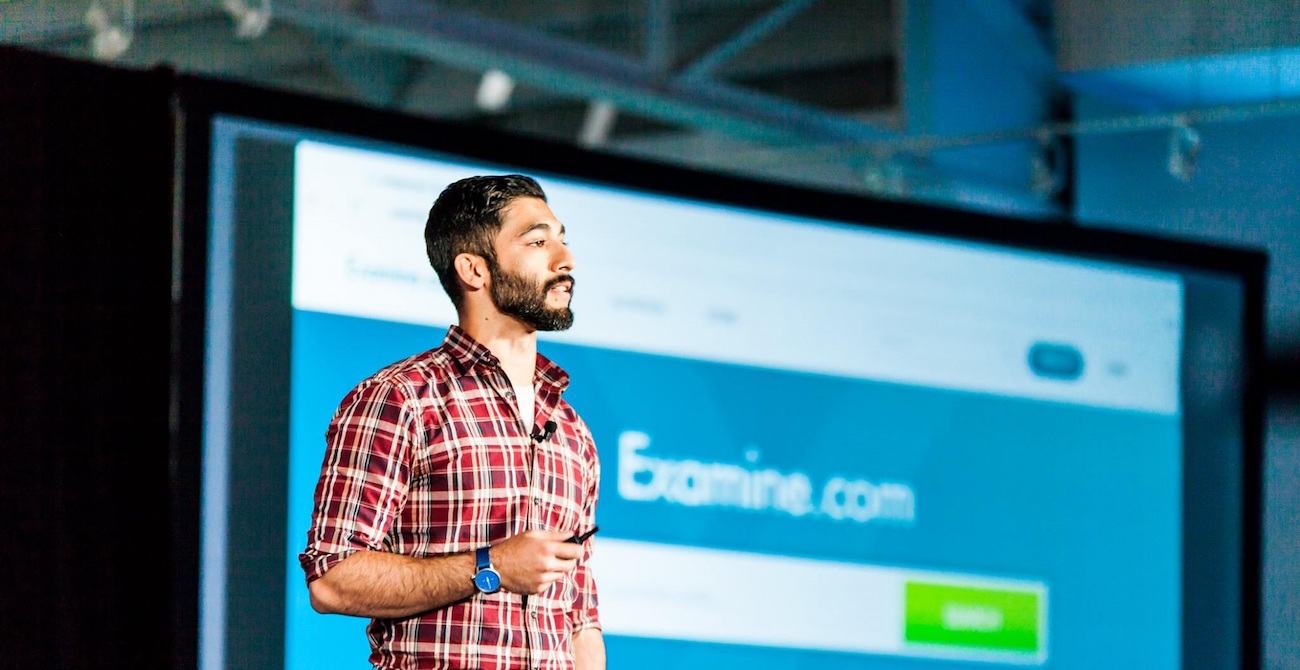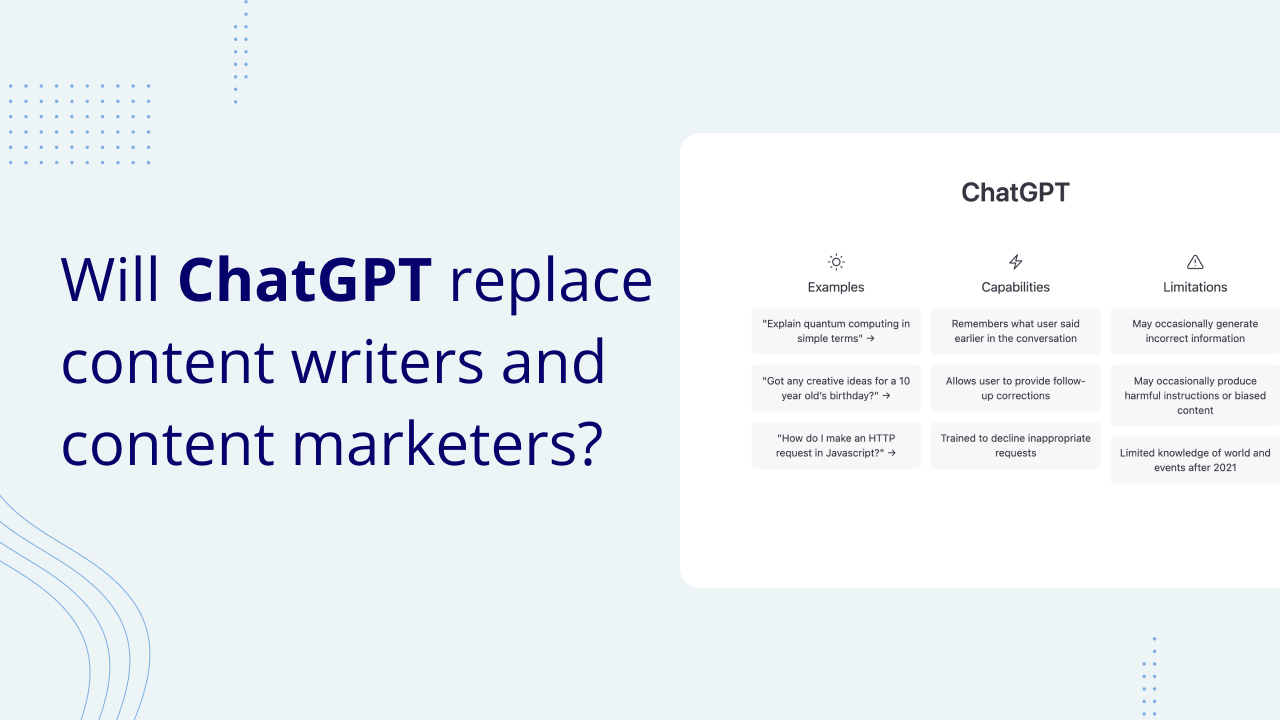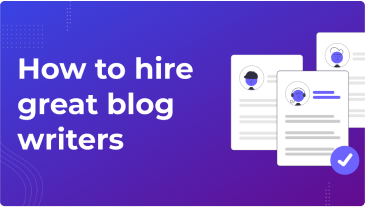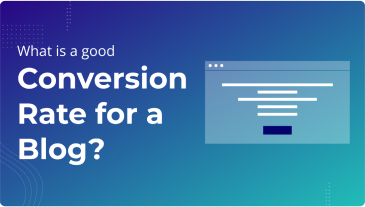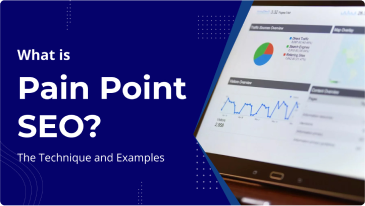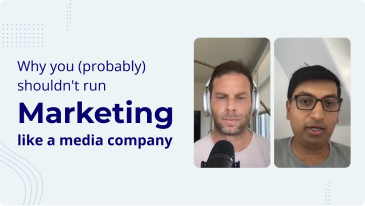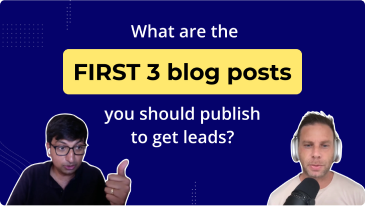It’s not everyday that you meet someone who has built an entire business off the back of a community like reddit…and a 7-figure one at that.
I got the chance to interview Sol Orwell (he legally changed his name), Founder of Examine.com, about the story behind his company. Sol walked us through the intricate details of how he recognized a pain point in the reddit fitness community and turned a simple idea into a site that attracts millions of visitors every year. Here’s his story:
In 2009, Sol Orwell, Founder of Examine.com was overweight (“obese”, as he calls it), and turned to reddit for information and support.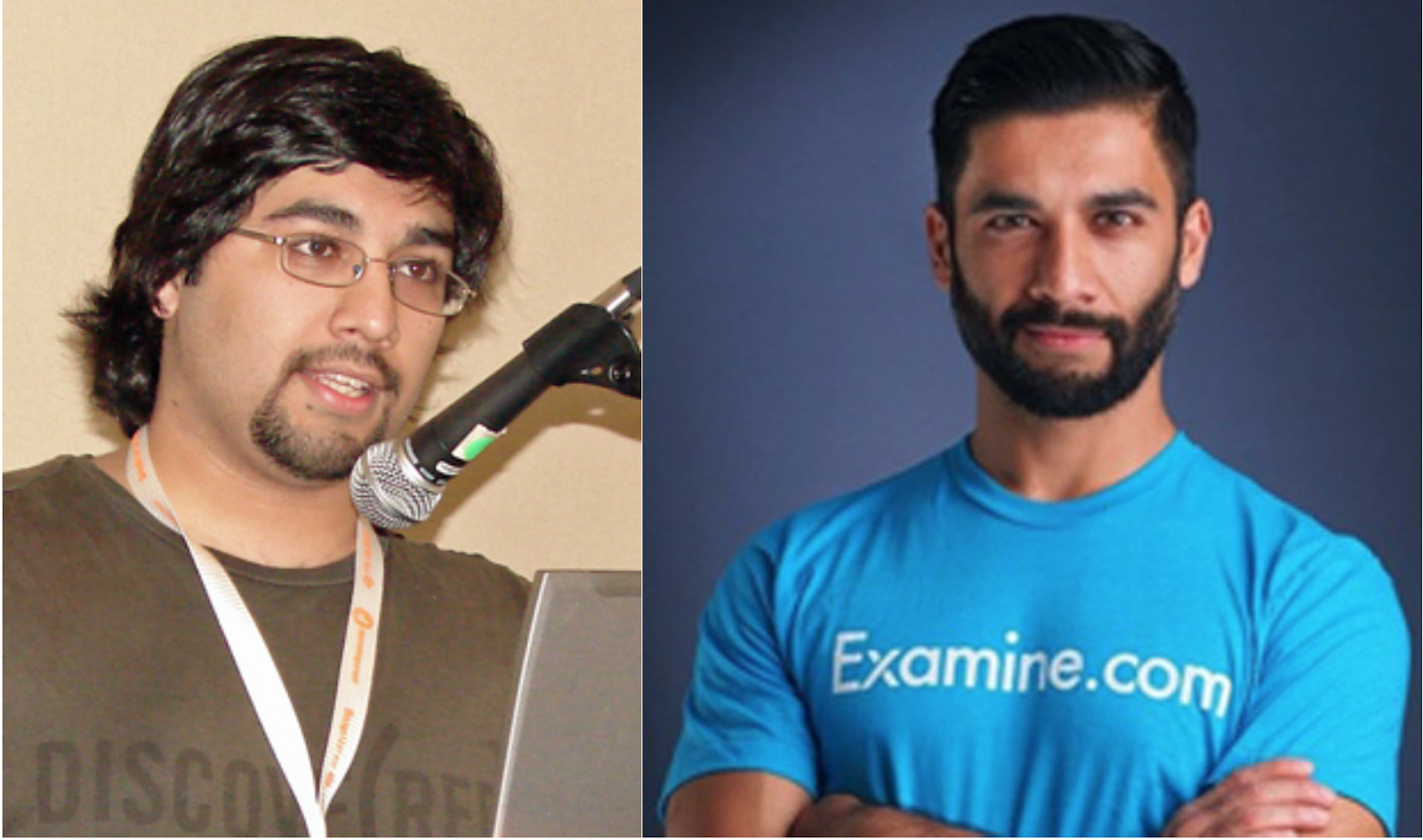
“As I was getting fit, I was reading fitness books and nutrition books – I was writing notes on what they were talking about. One of them was the Four Hour Body by Tim Ferris – I read it, I wrote notes on it and [posted the notes to reddit]. It was really popular, people really enjoyed it from there. And so that’s how I ingratiated myself in the community.”
“That’s how I originally came across my co-founder. His name is Kurtis Frank, aka silverhydra on reddit, he was actually a moderator for r/Fitness, and that’s how our relationship initially formed. And then the rest happened from there.”
Like this article? We produce stories like these for our clients, learn more here.
How Sol Came Up With The Idea For Examine.com While Perusing Reddit
Sol has been a “redditor” for the past 10 years. He credits much of his weight loss to joining the community r/Fitness (r/fitness is a “subreddit” or smaller community on the reddit platform), which has grown tremendously since he first began connecting with other redditors there.
“When I originally joined r/Fitness, there was maybe 5,000 people… when I released Examine.com, which was two years after that – it was about 50,000 people. Now in 2016, it’s about 6.2M people.”
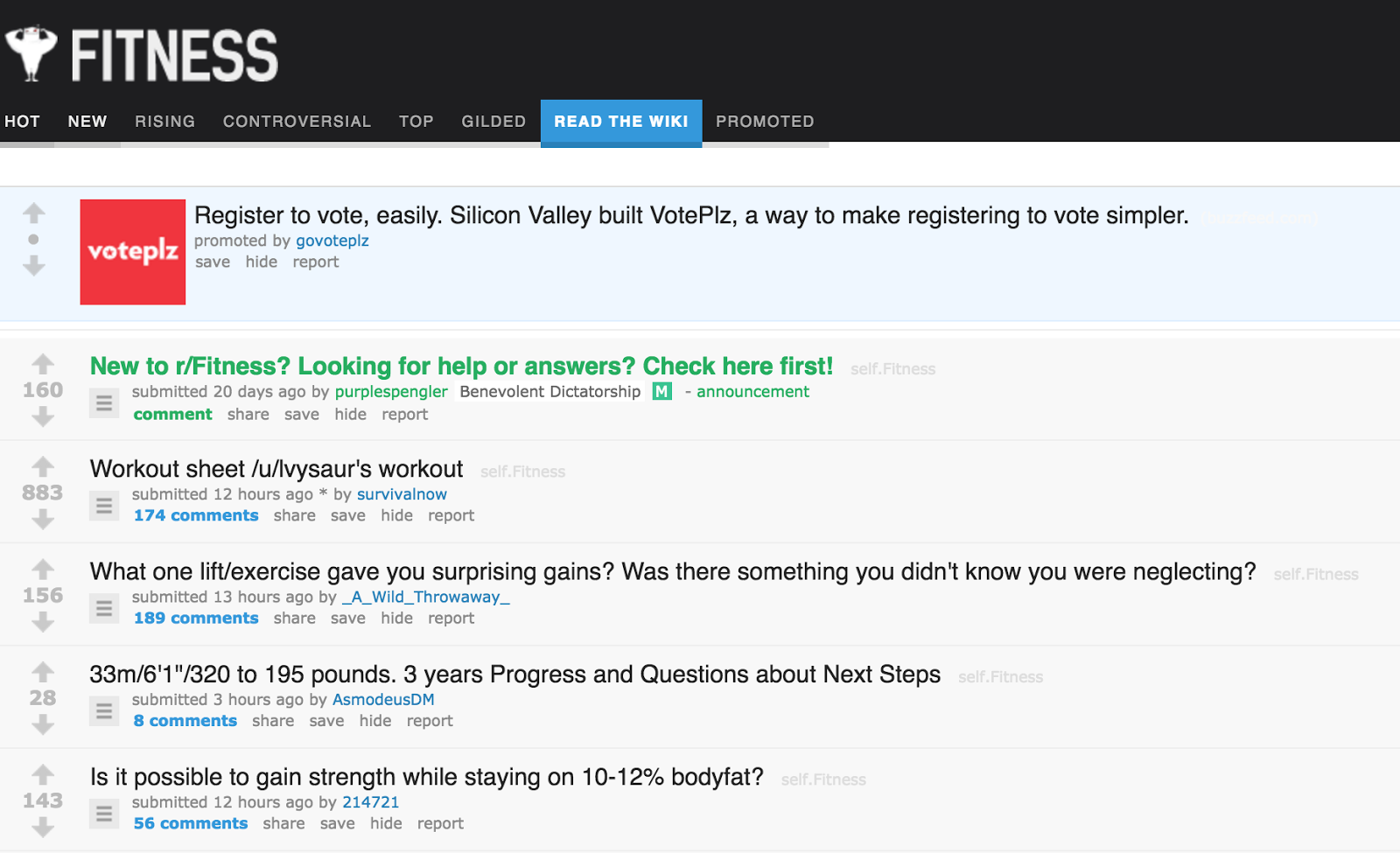
Over time, Sol began to notice a subtle pattern with reddit posts in r/Fitness: new members of the community would ask the same questions over and over again.
“We were frustrated when someone asked, ‘Is creatine bad for my kidneys?’ Kurtis, my co-founder, would spend 30 minutes, 40 minutes, an hour or something, researching all these papers, adding all these links to say ‘this is why creatine is okay for your kidneys’.”
He quickly followed with, “Because someone would come the next day and ask the same damn question — so you just go like ‘Dear God, these newbies keep asking these same questions’.”
Although he found these repetitive questions annoying, Sol looked past an easy knee-jerk reaction that these new users were just “lazy” and noticed that it’s not easy to find good information about supplements online. He noticed this problem for two years, but it wasn’t until he took a trip to South America that he really decided to do something about it.
“I was visiting some friends in Colombia – they were both postdocs – and I was complaining to them about how there’s all this terrible research out there about supplements.”
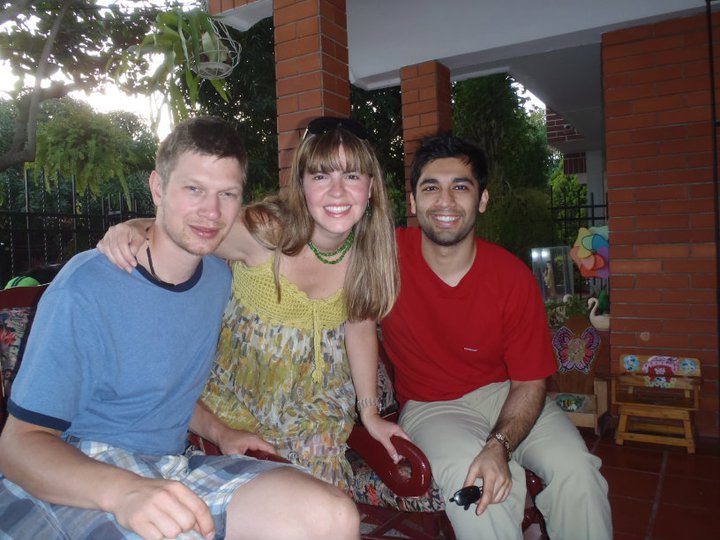
Sol explains, “There was no source of supplement information that anyone could trust. There’s Wikipedia but that’s not really for professionals, and everyone else is selling ads or supplements, so you can’t really trust anybody.”
Sol’s friends called him out. They said, “You’re doing nothing with your life, you’re being a bum, so either do something about it or stop complaining….”
He says, “I literally remember having this conversation with them and an hour later messaging Kurtis on reddit.”
Kurtis was finishing his dietetics degree at the time, and Sol presented his idea to him: why not make a website with well-researched, unbiased supplementation information? People would finally be able to get trusted information on supplements.

It helped that Kurtis was studying nutrition and loved researching it.
Initially though, Kurtis resisted, telling Sol that he was about to apply for his Ph.D. Sol’s reply was, “Fuck your Ph.D. This is an awesome opportunity for us.”
There was no founderdating needed. Kurtis knew him through reddit. “He had seen me posting…He knew who I was. He knew I worked online and he knew I had found some levels of success online,” he said.
That’s how Examine.com was started.
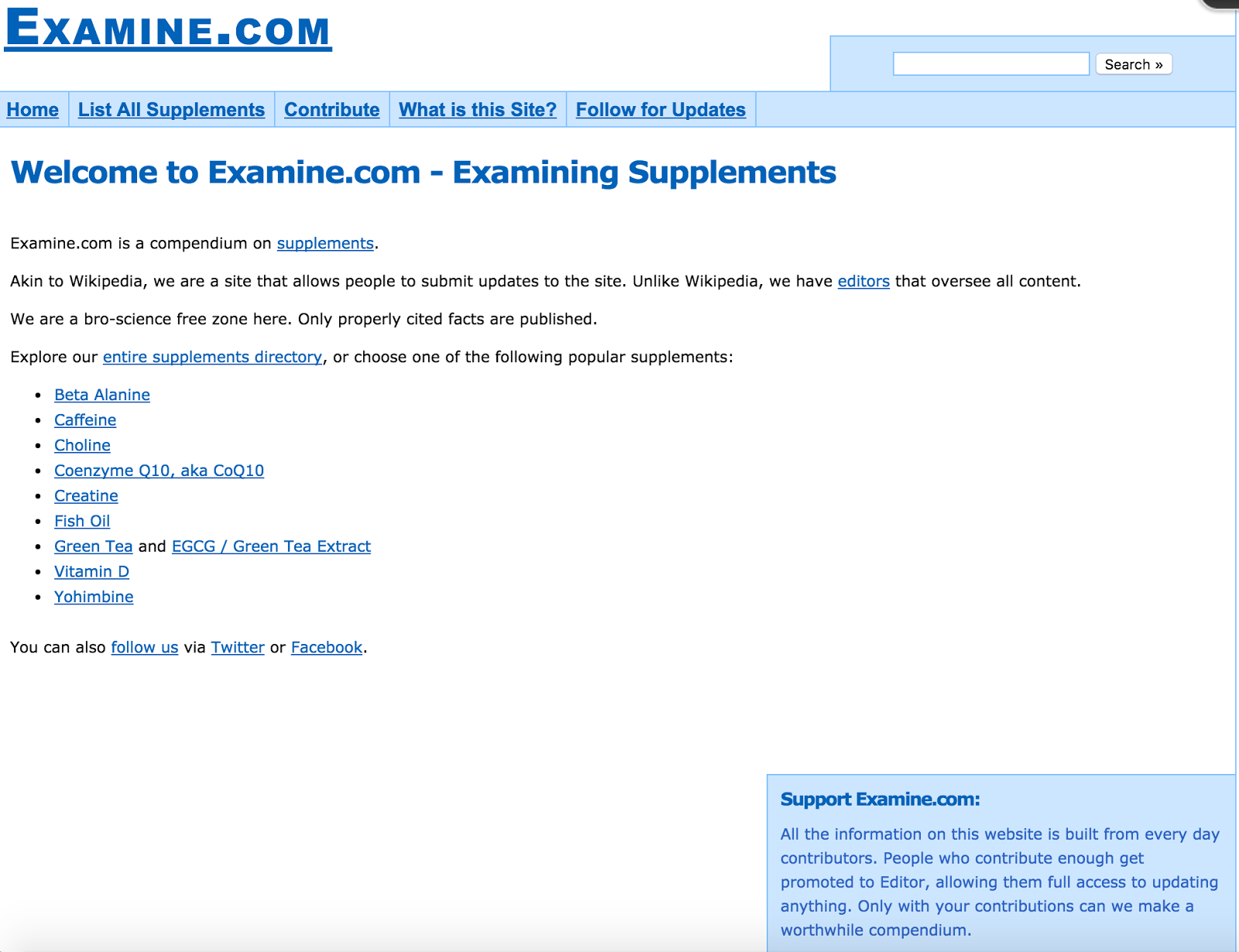
After coming up with the idea, the first thing he did was purchase an expensive domain name
Sol had been in the domain name industry previously, and after coming up with the idea for Examine.com, the next thing he did was buy a flight to Panama in search of a domain name.
As he said, “The idea came first, the domain came second. I used to be in the domain name industry — some of the biggest domain name brokers are in Panama, and that’s when I bought Examine.com.”
What’s interesting about this move is that it defies almost every piece of advice about starting a company – especially in the startup world. Most people preach that you should build an MVP first, get traction, and show proof of the concept before investing heavily in the idea.
But Sol did the opposite.
He decided the best way to start the company was to invest in the brand and a domain name.
The cost of the domain name? $41,000.
His reasoning: He wasn’t an eager artist chasing a dream and mortgaging his house to do it. He thought carefully about the investment and its returns.
“People always ask: that’s a lot of money to pay for a domain – this is true – but a domain name is not a sunk cost, it’s an opportunity cost. If I wanted to, I could’ve sold that domain name for $30k – $35k in 24 hours so it’s more like a sunk cost of $5k – $10k and an opportunity cost of $30k.”
The Early Days – Getting Traction on Reddit
After the two founded the company, they used reddit as their main source of traffic right from the get go.
They never approached reddit with the mindset of using it as a marketing vehicle though. Their traction with reddit was a function of Sol and Kurtis being genuine, real members of the r/Fitness community for a number of years. They solved a problem in the r/Fitness community, created something the users wanted, and for that the community embraced them.
As Sol puts it, “It was almost symbyotic right off the bat – we were making Examine.com and were going to talk about creatine or whatever, when people started to ask these questions, people just started linking to us.”
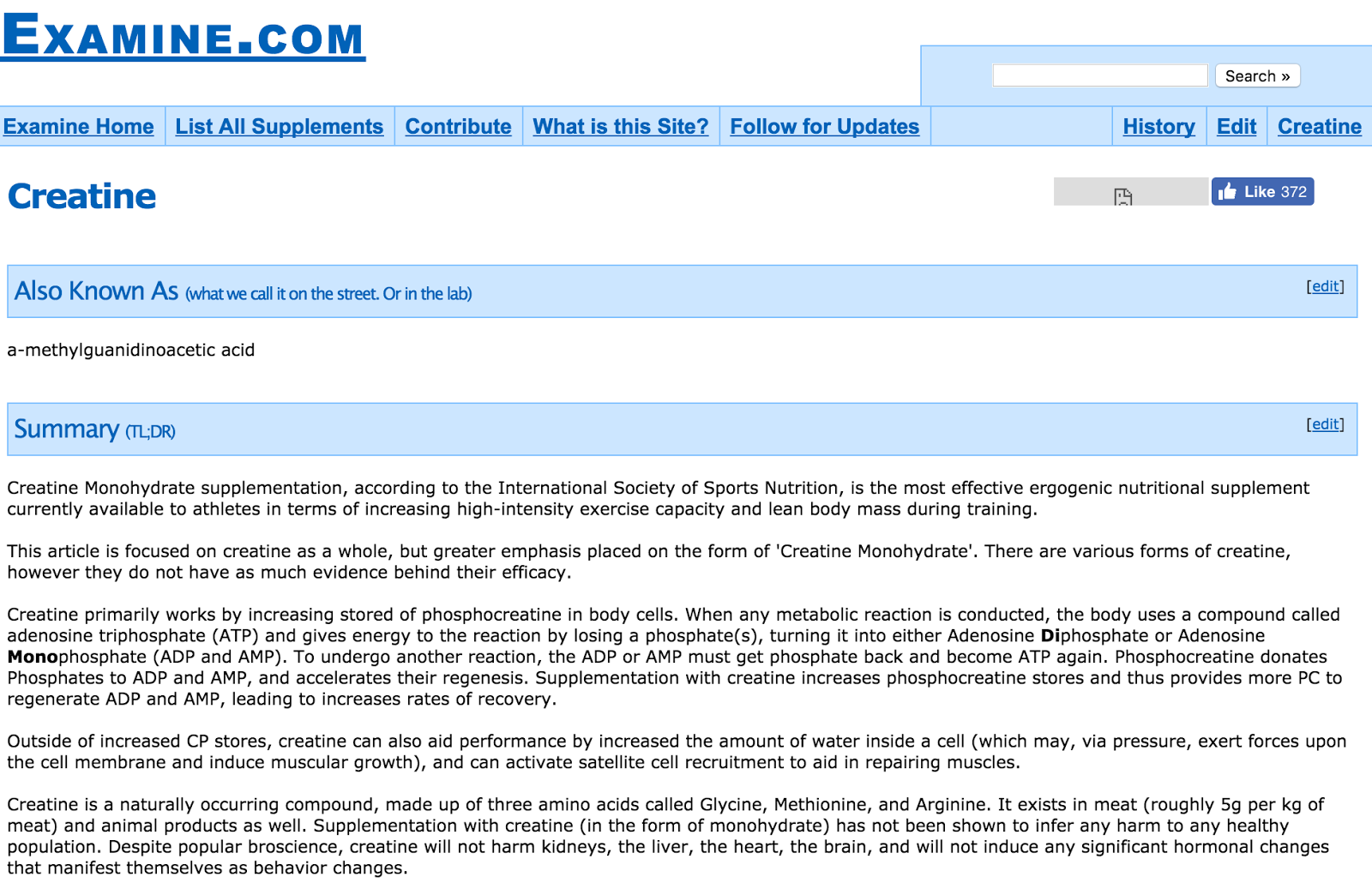
Sol makes this distinction intentionally: others were linking to them. They weren’t “dropping” links.
From an outside perspective – it might look like he started this site on a certain date and immediately got traction. But in reality, the traction that he got was 5 years in the making.
This is like admiring a star athlete’s lifestyle and thinking it came since they joined the NBA but lifestyle, the game winners, and the fame is all a product of decades of work in the gym by themselves.
Sol’s gym was reddit. And he put in the work, day in and day out, for years, before there was any site, any business, or anything to “market.”
“I think the fact that we were part of the community – I had been on there for 4.5 years and Kurtis was moderating, we were participating way before we ever came up with the idea for Examine.com. So it wasn’t like we came to reddit to promote our stuff, it was more like, we’re part of the community, we’ve built something, we built it because of our frustration within the community, and the community just wholeheartedly embraced it. “
Most marketing articles about “hacking reddit” will go through the same give-take cliche about adding value before taking from the community. But Sol’s story is not as simple as him mastering give and take.
Instead, he was a genuine part of a community and never thought, “now I’m ready to drop links.”
Sol says, “I think it was just that we were more real really captures it. We were real human beings, we had real interests, we were really part of reddit – so we didn’t really have to drop links, it was everyone just dropping [our] links afterwards.”
He also points out that redditors will check your profile and notice if you’ve only posted links for marketing purposes. Redditors will call you a spammer or be downright harsh to you if you’ve only posted in one or two subreddits, or only on certain topics. Both he and Kurtis are active in multiple subreddits on topics ranging from fitness to Toronto to the NBA.
That’s how they gained their initial traffic.
“I remember a year in, some guy accused me of being a shill, and I’m like, okay you know what, we’ll test this out. So I actually looked over 30 days of the traffic we were getting from Reddit and I think out of 68 links, I had dropped 1, right, so it was just one of those things where the community embraced us.”
The Transition From Site About Supplements To A 7-Figure Business
When the company first started, they didn’t know what they would sell. They just wanted to be the most trusted source of supplement information.
They were so focused on building trust that they made a decision early on that they wouldn’t sell anything that would breach the integrity of their brand. That meant no supplements, coaching, consulting, ads, donors or sponsors. This was a critical differentiator from every other company in this space.
As their audience grew, Examine reached out to their readers and asked about their problems to determine what product they could sell to their audience. Sol shares, “All 3 of our products have been purely generated via surveys. We would ask people what’s your problem? What do you wish you could do? The most common thing was ‘we wish you just had a table of all of the information you have’. ‘So if I wanted to look at supplements that affect blood pressure, I could look it up quickly’. ‘And I wish there was one place where I could look it all up’. And so we were like okay, that’s the initial source of monetization.”
After creating their first product, the Research Digest, which is a compendium of research about supplements and nutrition, the next big challenge was getting their product out to market. The solution: turn to industry influencers to help sell the product.
“I messaged over 500 people I knew in fitness and I said ’Hey, we’re launching this and we’re offering a 40% commission.’I had conversations with influencers on Facebook, and it took me one full week. I told people we were going to release the research digests on this day, and asked if they would announce the product and promote it? And people said yes.”
Instead of using well known affiliate sites, they built relationships through messaging fitness influencers on Facebook and by Email. They also decided to write their own referral software because Sol says, “A lot of the software out there, like Clickbank, sent you to a different URL and we wanted to redirect everyone to the same URL so Facebook thought there was one link.”
At its peak, 105 people in the fitness industry shared the link. Sol attributes much of the launch success to the fact that, “You can’t resist looking at something that 105 people shared.”
The initial goal of the product launch was 1,000 sales. After the first day they had already sold 600-800. By the end of the launch, they ended up with roughly 3,000 sales.
After they validated the initial product idea with a successful launch, the next step for them was to integrate the product into their site. Sol shares, “The #1 way we sell our reference (which was our initial product) is through our thank you page.” Together, they figured out that giving an instant discount when someone signs up for their email list results in higher sales.
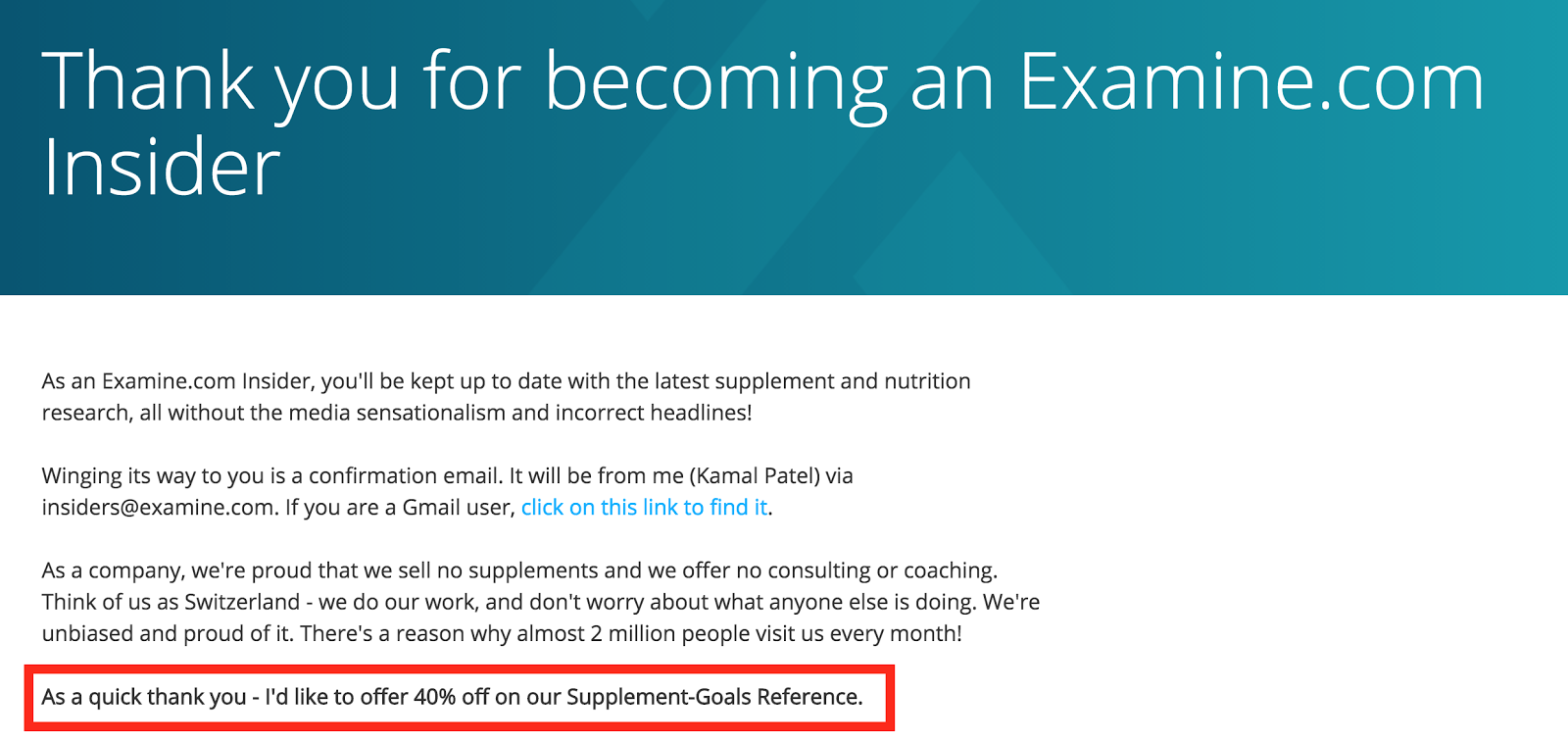
“The product is normally $50 and on sale it’s $20 or $30, and we sell something like 10-20 of these a day. Which doesn’t sound like a lot but it’s the initial product people buy.”
Sol attributes the ongoing success of their products like the Digest to careful, intentional differentiation from competing products. In particular, his team noticed that most fitness and health products are run amateurly. He’s quick to point out, “There are typos, the images are shit, the graphics are shit, the correspondence is shit.”
To stand out, they took the time invest in high quality graphic design and made sure the digest looked, as he put it, “gorgeous”.
This detail highlights the subtle interplay in Examine’s story between “lean startup” style decisions and choices that involved more upfront investment in quality and brand, like spending $41,000 on a domain name and spending extra on graphic design to make a beautiful digest.
One thing we can learn from Examine’s story is that these decisions weren’t binary. A company is not “lean startup” or “not lean startup”. There are hundreds of decisions an entrepreneur has to make every week, and deciding when to invest a lot, when not to invest a lot, when to go with instinct, when to ask customers can vary from decision to decision.
Today: A Product of Real Relationships
Examine.com has become one of the go-to resources for the health and nutrition industry.
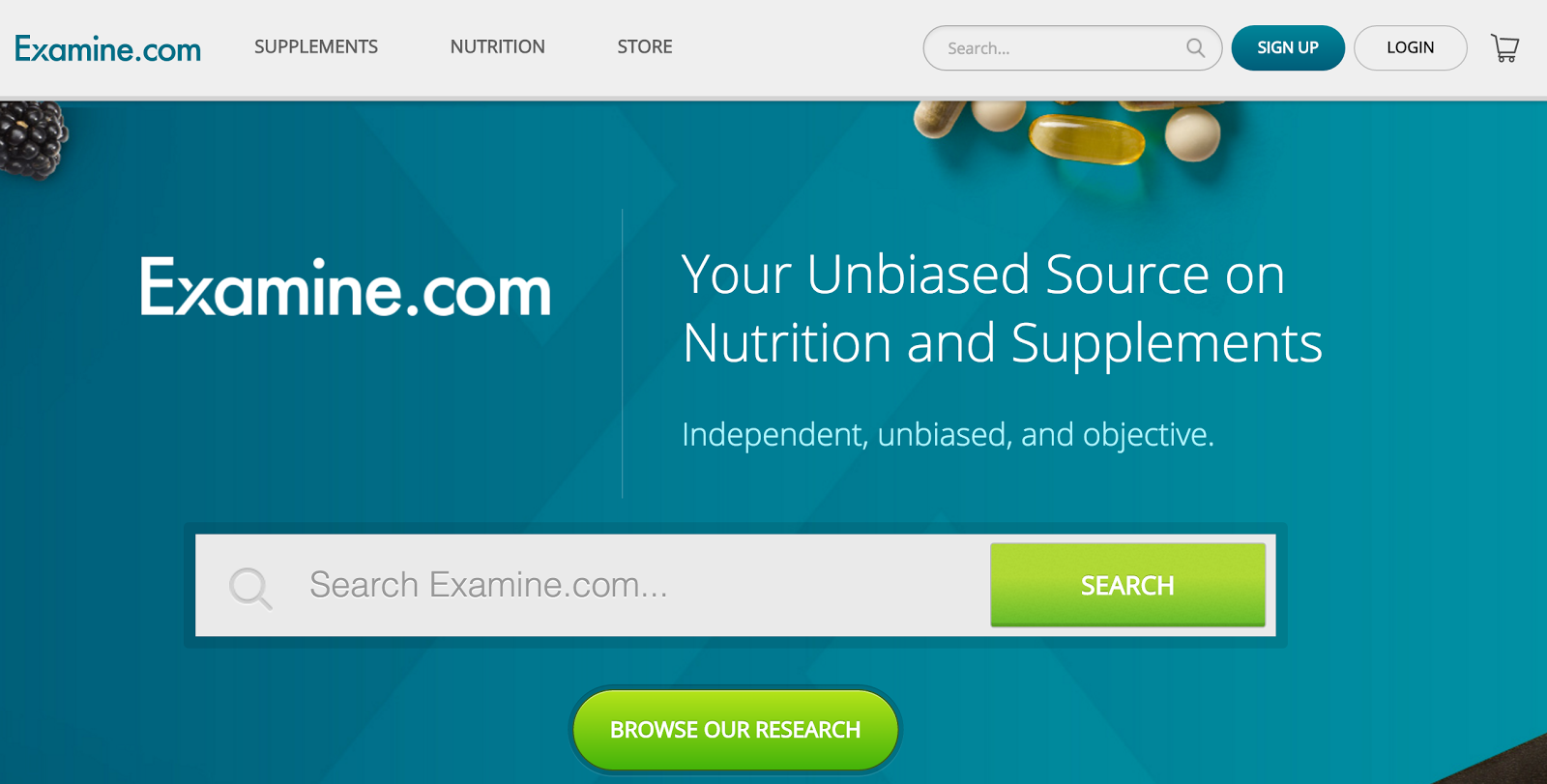
All that relationship building on Reddit has helped them rank on the first page for terms like “creatine” (#4, as of this writing), “fish oil” (#3), curcumin (#2), and more. Examine.com gets over 40,000 – 50,000 visitors a month from Google organic traffic.
“The nice thing is, if you’re an authority, people want to work with you. We get around 2M visitors per month, our email list is a couple hundred thousand people, and last year we did a hiring call for contributors to the site and we got over 500 PhDs to work with us. The mindset is to create authority, people can’t escape you – and they want to work with you.”
This was the plan that Sol had in the back of his mind the entire time. If you build a large enough brand, you can make money and attract the best in the industry to work with you.
“Now we have people wanting to work with us and align themselves with our brand, because that’s how powerful and reputable our brand is now.”
Many times success stories highlight the quick path to growth – but this idea and path to revenue wasn’t an instant success (if you are interested in how much he makes now, here’s Sol’s net worth).
Sol got the idea for Examine after spending years in a community, recognizing a problem, and then building a business around a concept that had a built-in audience. To monetize the business, he did it again, by asking their audience about their challenges. The key is that he invested years worth of time developing relationships with people online and offline who helped him on his path to success.
After all, how many people do you know that could tell a friend they met online to drop their Ph.D. dreams, because “we have an awesome opportunity”?
Want us to write an in depth case study or story like this about you or your company? We’ll also drive traffic to it. Apply here.
Like this article? We produce stories like these for our clients, learn more here.
More Stories Like This
Patrick Campbell Founder of ProfitWell Shares Why He Chose Scale Over Lifestyle
Growing a Digital Agency: How KlientBoost scaled from $0 to $1M in 12 months
Get More In Depth Profiles and Case Studies
Enter your email to get more in depth profiles and case studies like this one as they come out. You can opt-out anytime.

